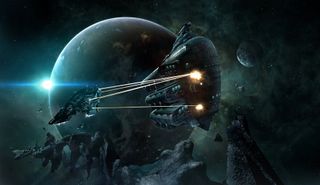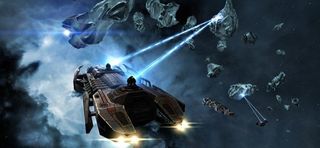EVE Online developers on the importance of harnessing player creativity

No developer gives its players more freedom than CCP, the Icelandic brains behind the wild-west space MMO EVE Online. Yesterday was the first time we've seen them really tell their players, "No, we don't want you to do that." We had a chat with lead game designer Kristoffer Touborg and senior producer Jon Lander earlier this month to talk about EVE's latest expansion and they took the opportunity to brag about their players.
Note: This interview took place before the crazy events of Friday . We've reached out to CCP for additional comments regarding player freedom in that specific situation, but not receive a response in time for this article.
PC Gamer: How are the new Kill Reports, introduced in Inferno, working so far? Do you expect them to replace fan-made killboards?
Jon Lander: [The Kill Reports] are basically the same information that you had before, but just presented in a way that's much more visually appealing and easy to understand. We've always had the ability to just mine our database for all the data and, if you like, be the single version of the truth. One of the interesting discussions that we're having around right now is—yeah, we could absolutely do an internal, global killboard. But then one of the things that we have to consider is that a lot of our players take a huge amount of pleasure in building their own killboards or modding the ones that they have.
There's a lot of data already out there. You look at things like Battle Clinic , and they have things you can get through there. They've almost got a whole ecosystem around it. One of the things I don't want to do is just ruin that kind of third-party developer creativity that we have. If we end up going down that route, we need to, first, offer something that's different. Because we have all the data, we feel like we've got the true history of what's happened in EVE. But also we'd need to allow people to mask their results for a period of time or whatever—there's a whole can of worms that opens when you want to do this.

But I think one of the things that's very appealing is, even if you're not giving direct access to every single killmail, you can start looking at things like leader boards. You know, who is the best frigate pilot in the galaxy? Or could we use this, for example, as some sort of precursor, entry requirement for joining an alliance? You could almost have these things run for much longer than the sort of qualifying rounds that we have now.
I think some people would love for us to do a global killboard. I also think a lot of people would hate it if we did one. So we have to weigh that very carefully. But I think the fact that we've got information that... We're able to do some really interesting things around that area. But it's kind of a jury's-out situation right now. It's one of the discussions that we have.
The biggest gaming news, reviews and hardware deals
Keep up to date with the most important stories and the best deals, as picked by the PC Gamer team.
PCG: That's really good to hear. A lot of developers see something that their playerbase is doing and think, "Oh! that's a really good idea. Let's take it over." But it sounds like you're more interested in supplementing what players are doing rather than replacing it.
JL: Yeah, exactly. We come from an interesting and fairly unique viewpoint on some of this. Our players usually come up with fantastic ideas. At Fanfest, we were announcing this technology we're using called CREST, which is how we're actually going to allow our players to read and write [to EVE's server files] through a third-party developer license.
You look at some of the tools that our players make, and they're fantastic. The reason they've made them is because they really should be in the game, and so we shouldn't just copy it for copying it's sake. We should make sure that [what we make] actually adds a huge amount to the experience of playing EVE. And this is the interesting part of that.
There's also so much we can do in this game, we're never going to get to it in five years or ten years. [We have to ask ourselves], "Where can we really add value, and where are the areas where our players can do it themselves?" We've had a really interesting discussion over the last few days with the CSM. You've got some high-level players there who're these social hubs that create all of this content with the people in their corporations and alliances. And they're basically telling us that the corporation management engine base is horrifically bad to use—it's a nine-year-old piece of kit, really. So they're saying, "Please, just let us make our own UIs. Please make this data available to us so that we can build our own applications around it."

And I look at how we could actually best use all the developers we've got here [at CCP] and say, "Well, we can either let the community build something pretty fast, and we go build something [else] really cool which would be a good addition to the game, or we could spend our own time just redoing these things, or actually making one up. It's actually a pretty nice position to be in, to say, "Hey, look. Here's a fairly average UI that you guys can use. We'll get to [improving] it eventually, but in the meantime, here's all the data. Why don't you do something which fits exactly what it is you want to manage?"
And that's constantly a thing that we're looking at now, which is, as we're going on nine years of EVE having been around and growing every single year, we've got a big game. We have a huge game, and we have a very limited number of developers to be able to work on nine years of features. So if we can harness that creativity in our playerbase, that can only be a good thing fo everyone.
PCG: This expansion also added a lot of new modules. Do you have specific goals for how you want to change combat with these new modules?
Kristoffer Tourburg: We have a few principles when we're working with the modules. The first one is that we don't really work with random chance. Just as a direction. EVE's a game where you get a concrete piece of information and then you have choices based off it, more than waiting for the one critical hit, so we don't really work with that.
For a lot of our modules, we tried to expand sideways rather than upwards, which means that instead of getting a tech three module, you'll get another tech two module that does something else. And then the final thing is that we'd like it to shake up warfare and add as many fittings as humanly possible, just to keep it fresh.
The target-breaker module is a fairly good example of that. It wasn't made as a response to the fact that large fleet battles are a bit mundane, but it might actually improve that. So let's see if it does that. But there's definitely a few principles we work by, that you can see in these modules.
Apart from that, I don't like solving specific problems with modules. A module should be something that adds player value, that they will somehow put into some framework in the sandbox, rather than me saying, "I don't like this ship doing something, let's make a module to change that." I think that's a bad way of expanding your library of modules.

JL: We have such a cross-section of different players now. We've got people who've been with us since beta nine years ago, and we've got people who have joined since Inferno. What we don't want to do is prescribe how you should use the tools that we give you.
This is the great thing about EVE: you can choose what it is you want to do in the universe. Some people want to just go around on their own and see the sights, other people want to be at the head of a 4000-person alliance, and everything in between. What we really can't do is, because we don't have the concept of classes, because we don't have a concept of, "This is your route through the game," it's really down to people to come into the game and decide what it is they want to do.
And if you're going to allow people that degree of freedom, you've got to give them tools that they can use in a number of different situations and combinations. So for us to go through the permutations of all those various things is just completely unrealistic. And actually, some of the great moments in EVE have come about when a player has found a new use for a module that makes us all sit around and look at each other and say, "Wow, I never would have thought of doing that."
Some of these have been bugs in the past, some of these have been something that's not in the module. And then we have great conversations about, "Well, should we fix it? Because it's actually enabling a player to do this particular role and live out this part of the story that they want to live out."
It's hard to be that prescriptive--to say, "We know exactly what this module is and exactly what it'll do and we know exactly how it will be used," because our players are just cleverer than us basically. There are a lot of them and they try a lot of things and they've got weird enough brains that they'll always find a unique use of something that we would never have thought of.
PCG: You've learned by now that it's best to not assume that you know what your players are going to do, because they'll always surprise you.
JL: Guaranteed. We have no idea what they will do next.
Most Popular





